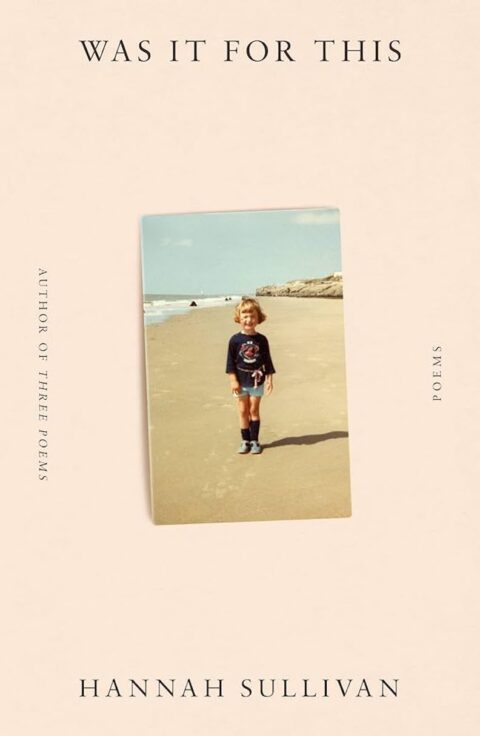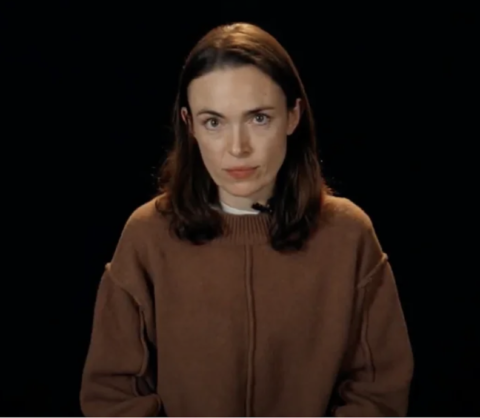 While writers like Elif Batuman adopt the wiser, creatively evasive tactic of pinching titles from the likes of Kierkegaard and Dostoevsky, today’s poet needs to have been temporarily enamored with lichens or the canals of Venice in order to adequately retcon their titles. The trendy imperative we seem to have settled on is that manuscripts ought to arrive thematically framed, bearing out the logic of their concepts — judged against one’s commitment to that initiatory gimmick, like a marathon runner one is encouraged by the industry simply to finish. As with Three Poems, Hannah Sullivan’s critically admired debut, Was It for This is a triptych, this time with a memoirish core indebted to — or at the very least, reminiscent of — “91 Revere Street,” the autobiographical text that bulked Robert Lowell’s influential Life Studies. Was It for This’ missing question mark reads rhetorically like condemnation, and the book provides ample fuel, with eulogistic rage for lives cut short, a string of lackluster jobs in England and America, and the sterility threatened anew each decade.
While writers like Elif Batuman adopt the wiser, creatively evasive tactic of pinching titles from the likes of Kierkegaard and Dostoevsky, today’s poet needs to have been temporarily enamored with lichens or the canals of Venice in order to adequately retcon their titles. The trendy imperative we seem to have settled on is that manuscripts ought to arrive thematically framed, bearing out the logic of their concepts — judged against one’s commitment to that initiatory gimmick, like a marathon runner one is encouraged by the industry simply to finish. As with Three Poems, Hannah Sullivan’s critically admired debut, Was It for This is a triptych, this time with a memoirish core indebted to — or at the very least, reminiscent of — “91 Revere Street,” the autobiographical text that bulked Robert Lowell’s influential Life Studies. Was It for This’ missing question mark reads rhetorically like condemnation, and the book provides ample fuel, with eulogistic rage for lives cut short, a string of lackluster jobs in England and America, and the sterility threatened anew each decade.
Sullivan may be every school teacher’s ideal, a writer who, eschewing invention of the fantastic kind, writes solely what she knows, what she has gone through either firsthand or psychically. A child that died unborn, asphyxiated in its mother’s womb, becomes a guiding metaphor for Sullivan the adult caregiver and wife, no longer “pre-” anything, in her view, with the exceptions of menopause and senility. The cool, anthropologist’s focus (to paraphrase the jacket copy) has thawed now to accommodate a lot of maudlin reportage, from sudden, this-will-have-been crying to daytime epiphanies in traffic roundabouts and grocery stores. Though frequently interesting, in these poems naming is repeatedly the vehicle for a superhuman empathy that tries to locate the pathetic in something as insignificant as breath mints: “I even cried for that, the brittle crunch of sugar on dental enamel.” Later, soap bubbles don’t pop, they “self-unskin.” Yet with what quiet lucidity Sullivan’s rhythms tumble down, when they do:
A little wedge of time
I’d spent on nothing much,
New Year after New Year
finding me playing pinball
or sitting, high, in a Mission
dive bar with naugahyde
booths beneath a lit-up
triptych of our Lady Guadalupe
listening to the gasping poof –
a succulent sound – of someone
in suspenders and a trilby
thrashing a dog pinata
till it split and candy corn
and drumsticks tumbled down,
the tamale lady picking up
stray wrappers from her cart
as she went round.
Three Poems fostered the disappointment of hindsight — that backward sneer at youth’s confidence — with a staggering degree of craft, weirding the idea of a sandbox or broken mosaic, meticulously so. That book’s style survives here extenuated, almost Jamesian.
The lyricism has carried over as a sort of baked-in promise, while the quality of observation dips in the pursuit of what, after 80 pages, grows plainly meandrous. A trip to the supermarket, for instance:
In the 1980s the building was new. Now it was dishevelled and complicated. But it didn’t look just old, harmoniously old – the way a thatched cottage sprouts with grass and looks as if it might soon subside into the soil. It looked failed. There remained, despite its age, an insolent attitudinising futurism about the design – brutalism without the concrete.
I did my shopping hurriedly and then sat in the cafe until the street market outside closed and the carpark was dark, and children started appearing in the aisles in their uniform.
Expressivity per se has an ephemerality to it like steam; this assemblage of blocky prose and interspersings of verse, despite varied allusions to the author’s fears about sprouting those unsightly hairs of middle age or giving off a complicated air, results in something like a fiercely intelligent diary. Complaining monologues on India pale ale or linoleum, school uniforms or Google, feel tossed-in. You wonder what their truer message and shape could be: the inner mineral, the iceberg’s submerged half.
 Sullivan continues to be a terrific auditor of stuff, except with the addition of a loquaciousness that shows and tells in equal measure without always furnishing the poem’s decisive why. Like Karen Solie, her vocabulary is partly rare, partly technical (e.g., the “donutisation” of London’s area codes, clarty scones, skirts being “hoiked up”). They’re all here, the titans of post-internet life — Amazon, Uber, YouTube, plus newcomers Paw Patrol and Peppa the Pig, ubiquitous kid’s shows, as though nowadays our cultural denominator were apps. Imagery reminiscent of the Martian School, a brief, influential movement whose greatest disciple was the Australian poet Les Murray, is strung together and forgotten in quick succession; likewise obscure verbings (others we’re used to, such as the Solie-esque upcycle). The term Sullivan uses to discuss her son’s gradual rejection of once-loved toys is cathexis, from the Greek for “holding,” with its psychoanalytic opposite, decathexis, being possibly the antidote to her lacrimae rerum. Moreover, refrains like “If you can make yourself into a nut. / If you can Marie Kondo everything” are likely to remind Sullivan’s few detractors of the clutter of Three Poems. If many of the stanzas in Was It for This need tidying up, it’s for too much of a good thing.
Sullivan continues to be a terrific auditor of stuff, except with the addition of a loquaciousness that shows and tells in equal measure without always furnishing the poem’s decisive why. Like Karen Solie, her vocabulary is partly rare, partly technical (e.g., the “donutisation” of London’s area codes, clarty scones, skirts being “hoiked up”). They’re all here, the titans of post-internet life — Amazon, Uber, YouTube, plus newcomers Paw Patrol and Peppa the Pig, ubiquitous kid’s shows, as though nowadays our cultural denominator were apps. Imagery reminiscent of the Martian School, a brief, influential movement whose greatest disciple was the Australian poet Les Murray, is strung together and forgotten in quick succession; likewise obscure verbings (others we’re used to, such as the Solie-esque upcycle). The term Sullivan uses to discuss her son’s gradual rejection of once-loved toys is cathexis, from the Greek for “holding,” with its psychoanalytic opposite, decathexis, being possibly the antidote to her lacrimae rerum. Moreover, refrains like “If you can make yourself into a nut. / If you can Marie Kondo everything” are likely to remind Sullivan’s few detractors of the clutter of Three Poems. If many of the stanzas in Was It for This need tidying up, it’s for too much of a good thing.
Every so often, however, a quickening is introduced that will, without warning, drop the punctuation or throw a syntactic wrench into a line (“how mired / I was in time there was no / record of or memory / otherwise now anywhere”; “[d]istance diminished in the sky, the yellowness was gone, / A rush of blood him you a gulp the body swallowing”). This is brutally appropriate for the mournful first section, “Tenants,” which gives voice to victims of the Grenfell Tower fire as well as responding emergency personnel; arranged in a diptych of parallel columns, the transcription of a panicked 999 call …
I’m having trouble hearing It’s very dark in here
It’s balancing the risks The windows [sic] blowing out
You don’t know what’s outside It’s very hot in here
You need to get wet towels It’s very hot
Oh please
I’ll keep you on the line
They’re coming for you now
What floor is it you’re on I’m calling from the Westway
But look it’s your decision
You want to send them all, love
I said it’s your decision You want to send them all
I said it’s up to you
If you need to leave
Just go
Hello?
… interrupts Sullivan’s own dramatizations of the tragedy, gleaned from the government inquiry that followed.
“Tenants” presents a moving transmutation of officialese—you don’t know whether to sob or start a petition—worthy of Charles Reznikoff’s Testimony, a multivolume epic, based on thousands of archival court documents, that recast gruesome mishaps and murder as cold poetry. (That book, like Sullivan’s, echoes the workplace axiom that safety regulations are written in blood.) Compared to literal breathlessness, the clenched acceleration of remembered sex overmasters its own telling; the momentum of the sentence won’t be checked with commas, a familiar shorthand for orgasm. By the end of the page, as if in metronymic fulfillment of that act, we’re thrown into “the length and breadth and depth of hell,” from the suffocation of a fetus, “his mother running large with him back up the stairs,” to what is cruel in its blatant surreality and sad slapstick:
Some started hanging sheets, some jumped.
I felt the body glancing on my back,
A fireman said, I saw the leg pop off.
It sprang off with its slipper on, it ran.
Elsewhere, minor ironies like “[a] blazing EXIT HERE sign” or “sprinklers turning in the garden squares” taunt the collective unconscious of those who are forced to stew in disaster’s half-life, passing the ruins on your morning commute (“In the burned-out tower dawn happens in an instant”) then, like a scene out of Don DeLillo’s infinitely prescient White Noise, catching the spectacle at home:
But in the footage on TV
As the whiteness billowed higher,
I saw someone who looked like me
Just waving at a window.
Though Sullivan refers, on the facing page, to firebombing during the Second World War, American readers will of course be reminded of 9/11. In time, grief’s immediacy does cool, enough to handle it oneself, before staining as history. Sullivan even indulges in a bit of typographic signaling à la Art Spiegelman’s In the Shadow of No Towers, as the absence calcifies into a grim presence:
Now when I walked into that street, walked north
It stood it was just there.
A blackened shell or husk, the papers said,
A blackened skeleton. A mausoleum.
 How does one discuss the impossible? Hurriedly, rubber-necking at the carnage? Grenfell is too white-hot, too brilliantly macabre for a single take, lest the sentiment cauterize and numb. The mind blanks at the glare, as Larkin had it. Sex and death — “I wanted to lie on the ward smoking, looking up at the sparrows, sometimes napping, and I wanted it cradle to grave,” says Sullivan in the book’s concluding third, “Happy Birthday.” This last poem has a surfeit of wishes and is the more casually erudite of the three, with tossed-in nods to Mozart and Matthew Arnold (“a long withdrawing roar of / Avalanche!, the scuff of / falling cushions”), besides Latin aphorisms and a sprinkling of Greek in the original, namely a quotation from Homer. You can’t quite forget that Sullivan teaches at Oxford. Still, the poem’s title, like the collection’s, begs questioning. Is there not a measure of adjectival doubt — in fact, what sort of birthday?
How does one discuss the impossible? Hurriedly, rubber-necking at the carnage? Grenfell is too white-hot, too brilliantly macabre for a single take, lest the sentiment cauterize and numb. The mind blanks at the glare, as Larkin had it. Sex and death — “I wanted to lie on the ward smoking, looking up at the sparrows, sometimes napping, and I wanted it cradle to grave,” says Sullivan in the book’s concluding third, “Happy Birthday.” This last poem has a surfeit of wishes and is the more casually erudite of the three, with tossed-in nods to Mozart and Matthew Arnold (“a long withdrawing roar of / Avalanche!, the scuff of / falling cushions”), besides Latin aphorisms and a sprinkling of Greek in the original, namely a quotation from Homer. You can’t quite forget that Sullivan teaches at Oxford. Still, the poem’s title, like the collection’s, begs questioning. Is there not a measure of adjectival doubt — in fact, what sort of birthday?
Was It for This may be catnip to card-carrying members in the club of the bitter; for the stone-hearted, it is analogous to a lecture on how clouds form (“It was all bland, harmonious, / and given to us: / a ravishing for-nothingness”).
The trouble isn’t lack of variety but a certain density of purpose, stretching readers’ attention on little to no stakes; not so much idée fixe as fixation itself, an emotional treadmill written to exercise its author’s obsessions (perhaps by accident, size 0 diapers are mentioned twice, while smaller phenomena — the rain, dropped coins — behave “giddily”). This is a grandiloquent worry stone of a book that at last finds solace in a moth, greatest of clichés. Missing the sheer linguistic prettiness of Three Poems, “I wanted all of it again”: the wordy jewelry and the poet’s honed knowingness, intelligent as steel wool. Cave quid optes.
[Published by Farrar, Straus & Giroux on January 2, 2023, 128 pages, paperback edition available on 1/9/24, $17.00]